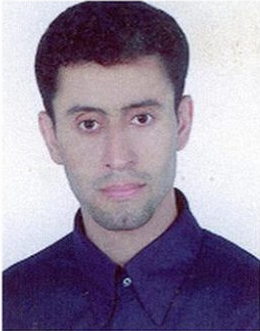Mr. Hadi Rashedi was from Ramshir (Khalafieh), a town located to the south of Ahvaz. He was 40 years old, a [high school] chemistry teacher, and an Arab activist of Khuzestan [Province]. He held a Master’s degree in applied chemistry and taught chemistry at Doctor Hessabi High School in the town of Sarbandar. One of his educational activities was to hold free classes for Arab students who were held back due to language differences, [not being Farsi speakers]. Mr. Rashedi was frail and thin and suffered from heart disease. He had, therefore, been exempted from performing [mandatory] military service.
Mr. Rashedi was also a founder of the Al-Hiwar Scientific and Cultural Organization (“Hiwar” meaning “Dialogue”) in Arabic, which was inspired by former President Khatami’s slogan “Dialogue among Civilizations,”) which had obtained temporary authorization [to operate] from the [offices of the] National Organization for Youth* in 2001-2002. Al-Hiwar held cultural programs in Arabic, as well as cultural and educational classes for the young people of [the town of] Ramshir. It was also active in promoting Arabic language and culture, as well as women’s rights. The activities of the young members of the organization were very well-received by the people of Ramshir. As a result, in the second City Council elections in 2002-2003, all five candidates supported by Al-Hiwar were elected. (ABF’s interview)
Subsequent to street demonstrations by Iranian Arabs residing in Khuzestan [Province] in 2005-2006, the Al-Hiwar Organization was declared illegal. Mr. Rashedi and other members, however, continued their activities by establishing a library and holding study [groups and] meetings at their homes. Continuing these cultural activities led to the members being summoned and interrogated by the town’s security apparatus. Between 2006 and 2009, Mr. Rashedi and the other members of Al-Hiwar were summoned and interrogated numerous times by the Ministry of Information. (Justice for Iran) The security people accused them of promoting ethnic thinking and demanded an end to their meetings and study sessions.
Mr. Hadi Rashedi was arrested on February 28, 2011, along with a number of other members of the Al-Hiwar organization from the cities of Ramshir and Ahvaz. Mr. Rashedi spent 7 months in solitary confinement at the detention center of the Ministry of Information, undergoing severe physical and mental torture. He was transferred to Karun Prison only after he had been forced, under tremendous pressure, to confess on television. (confession aired on Press TV in the winter of 2012). During the time Mr. Rashedi was at the Information Administration’s detention center, his family only visited him once, for 15 minutes, four months after his arrest. ( Justice for Iran, ABF’s interview)
The exact date of Mr. Rashedi’s execution is not clear. On December 7, 2013, security agents transferred Mr. Rashedi and Hashem Shaabani from Karun Prison to an unknown location. Finally, on January 29, 2014, after 53 days of complete silence, agents of the Ministry of Information informed Mr. Rhasedi’s family that he had been executed three or four days earlier. The authorities refused to surrender the bodies to their families and warned them against holding mourning rituals in mosques or other public places, allowing them only a limited mourning in their homes for 24 hours.
